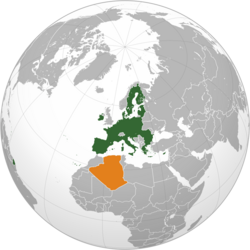Algeria–European Union relations are the foreign relations between the country of Algeria and the European Union.[1]
 | |
European Union |
Algeria |
|---|---|
History edit
Algeria was a member of the European Community during its incorporation with France and after its independence from France. Algeria was a member of the European Community until 1976 when a formal treaty excluded Algeria.[2]
Trade edit
Algeria has been in an association agreement and a free trade agreement with the European Union since 2005.[3]
In 2016, 67% of Algeria's exports went to the EU and 44% of Algeria's imports came from the EU.[4] Fuel and mining products made up 95.7% of EU imports from Algeria in 2017.[3] Chemicals represented the second most important exported product, worth 2.9% of Algeria's exports to the EU.[3] The EU's main exports to Algeria are machinery (22.2%), transport equipment (13.4%), agricultural products (12.8%), chemicals (12.8%) and iron and steel (10.2%).[3]
Funding and assistance edit
Algeria is receiving €108 million - €132 million under the European Neighbourhood Instrument.[5] Currently funds are being used to promote economic efficiency, economic governance, and economic diversification, as well as strengthening democracy and reducing pollution.[5]
Algeria is a member of the Euro-Mediterranean Partnership. Algeria also receives funding under the Development Cooperation Instrument (DCI), under programmes such as the European Instrument for Democracy and Human Rights.[4] In total, these funds under the DCI were €5.5 million for 2015–2016.[4]
The European Union is helping Algeria with its accession to the World Trade Organization, as well as holding informal talks on migration.[3]
Chronology of relations with the EU edit
| Date | Event |
|---|---|
| 1 January 1958 | The European Economic Community is established. |
| 3 July 1962 | Algeria gains independence from France following the Algerian War. |
| September 2005 | The EU-Algeria Association Agreement enters into force.[3] |
| 7 March 2017 | The EU and Algeria adopt new Partnership Priorities.[3] |
References edit
- ^ Although there has been a large degree of integration between European Union member states, foreign relations is still a largely intergovernmental matter, with the 27 members controlling their own relations to a large degree.[citation needed] However, with the Union holding more weight as a single bloc, there are at times[vague] attempts to speak with one voice, notably on trade and energy matters. The High Representative of the Union for Foreign Affairs and Security Policy personifies this role.
- ^ Brown, Megan (2022). The Seventh Member State: Algeria, France, and the European Community. Harvard University Press. ISBN 978-0-674-25114-4. Archived from the original on 9 February 2023. Retrieved 27 March 2022.
- ^ a b c d e f g "Algeria". European Commission Trade Policy. European Commission. Archived from the original on 18 January 2020. Retrieved 2 May 2020.
- ^ a b c "Algeria" (PDF). European Commission. European Commission. Archived (PDF) from the original on 14 December 2020. Retrieved 2 May 2020.
- ^ a b "Algeria". European Neighbourhood Policy And Enlargement Negotiations. European Commission. Archived from the original on 21 April 2020. Retrieved 2 May 2020.